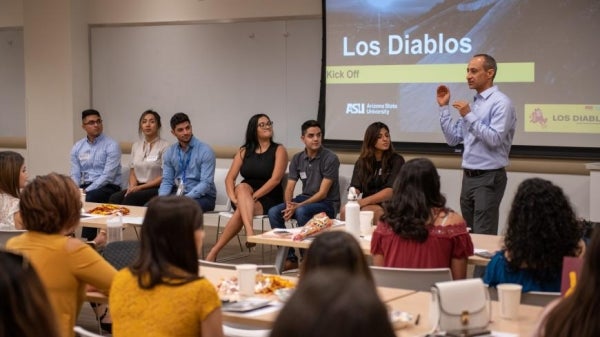Graduate student finds mentorship and support in Edson College's PhD program

The experience Kenja Hassan has gained during her PhD program is translating to the community, leading to real-world solutions to help end the HIV epidemic in Phoenix and beyond.
Kenja Hassan’s job is to build meaningful relationships between Arizona State University and diverse communities. Specifically, she acts as a liaison for the university with African American and Asian American community leaders and organizations.
It’s a role she not only loves but excels at, as evidenced by her recent promotion to assistant vice president of ASU’s Office of Government and Community Engagement.
“I consider myself knowledgeable about issues affecting the African American community because of my job and my race,” Hassan said.
So, it came as a surprise to her to learn just how stark the disparity for African American women with HIV has become.
“The community doesn’t talk about this health issue. I think it’s an important knowledge gap to address for African Americans locally and for people who are affected,” she said.
According to the most recent statistics, HIV remains a top 10 cause of death for African American women between the ages of 20–44 nationally. It is not a top 10 cause of death for any other group of women at any age.
One of the ways she’s addressing it is through her doctoral program. Hassan is enrolled in the Nursing and Healthcare Innovation, PhD offered through ASU’s Edson College of Nursing and Health Innovation.
Her research focuses on this complex issue by investigating what’s behind the statistics and working toward identifying solutions to address this critical health issue.
Hassan explained that she found out about Edson College’s program through her co-worker, a nurse, who had actually started the PhD herself and loved it.
“One of the important and helpful things for people to know is that this Nursing and Healthcare Innovation PhD is a research degree, not a practice degree. I don’t have a medical background and it’s not necessary to do well in the program.”
Still, most of the other students in her cohort are nurses, something that Hassan says has been really beneficial for her because of their caring and compassionate nature. She found support and comradery from her cohort, which given the intensity of a PhD program was valuable.
“My fellow students and I were all very interested in looking after each other and making sure that we were all successful. It would have been a lot harder to continue without them.”
The same goes for the faculty and program mentors who model a culture of caring, creating an environment that encourages success but not at the expense of one’s sanity.
Hassan sums it up this way, “This is a discipline about caring for other people, so how can we shape a future where people are better cared for? And that comes through from the faculty. There is this sense of compassion that is different from other disciplines.”
That doesn’t mean that their research is any less rigorous. Though Hassan admits she didn’t know what to expect from a doctoral program when she first started it.
What she discovered was that in a PhD you’re really learning the research process. And when she came to understand this it reinforced her respect for professors and researchers even more.
“I knew their work was difficult, but now, having experienced this process for myself, I really understand how hard it is.”
Her biggest piece of advice for those considering a PhD program is to spend some time figuring out what they really want to study. In fact, she recommends maybe even doing a little work ahead of time to ensure the research project is something that can be followed through with.
Of course, she is partial to the Edson College program and wholeheartedly recommends it to anyone with an interest in health care, no matter their background because the fact is, it affects everyone.
“Health care in the United States is an ongoing challenge and the more we know about how the system works and how to help people through it, the better off we’ll all be.”
Hassan’s research is mostly complete. Right now she’s in the analysis and writing stage with a few chapters down in her dissertation. If all goes to plan, she’ll finish the program sometime in 2021.
And in the meantime, she’s incorporating some of what she’s learned into her job at ASU and her role as an appointed member of the City of Phoenix Fast Track Cities Initiative.
Specifically, Hassan has been speaking at events large and small, about the devastating impact of HIV-related stigma on African Americans living with HIV. She’s also sharing her knowledge on patient-provider relationships with local organizations to improve communication and build trust.
Ultimately, her experiences in the program are translating to the community, leading to real-world solutions to help end the HIV epidemic in Phoenix and beyond.
More University news

Lester Godsey joins ASU as chief information security officer
With a career spanning nearly three decades of professional IT experience, Lester Godsey is back where he first started — serving…

ASU a top-ranked university for graduate employability
Students usually seek higher education degrees to build their skills and aptitude in their chosen vocation, and advance their…

ASU Alumni Association to honor 3 outstanding alumni leaders during Homecoming
The Arizona State University Alumni Association will proudly recognize three innovative alumni leaders during the Homecoming…